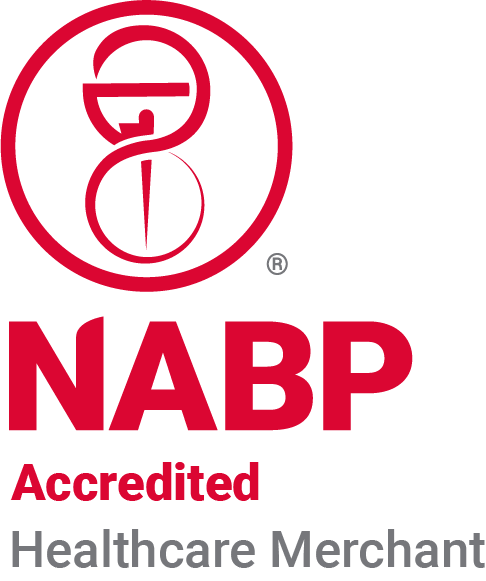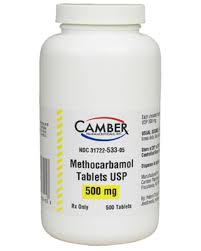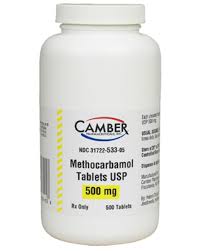Providing Quality & Trust
Methocarbamol Tablet
Anda Inc.
$0.11 - $10.64
$0.11 Each
Detailed Description
Methocarbamol
(meth-oh-kar-ba-mole)
- Description: Muscle Relaxant
- Other Names forthis Medication: Robaxin®
- Common Dosage Forms: Veterinary: 500 mg tablets & 750 mg tablets.
Methocarbamol is an oral medication prescribed by veterinarians to help treat muscle spasms in dogs and cats. More specifically, this relaxant is used to treat muscle spasms caused by acute inflammation, as well as traumatic conditions, or spasms occurring from poisoning. Methocarbamol comes in an oral tablet making it especially easy to disguise in your canine or feline's favorite food.
Customers may receive this drug under the names Robaxin, Robaxin V.
- Oral tablets, centrally acting muscle relaxant; appears useful in treating muscle tremors associated with toxic agents
- Contraindications include food animals and animals with a hypersensitivity to methocarbamol.
- Adverse effects include sedation, salivation, emesis, lethargy, weakness, and ataxia.
- IV administration should be slow, not to exceed 2 mL/minute in dogs and cats. Extravasation should be avoided. May be given IM but not SC
How is this medication useful?
Methocarbamol is a muscle relaxantthat can be used to treat muscle spasms caused by trauma, inflammation, or certain toxicities.
The FDA (U.S. Food & Drug Administration) has approved this drug for use in dogs and cats as adjunctive therapy of acute inflammatory and traumatic conditions of the skeletal muscle and to reduce muscular spasms. In horses, it is approved as adjunctive therapy of acute inflammatory and traumatic conditions of the skeletal muscle to reduce muscular spasms, and effect striated muscle relaxation.
You and your veterinarian can discuss why this drug is the most appropriate choice.
Uses/Indications:
Methocarbamol is FDA approved for use in dogs and cats (PO or IV) and horses (IV only) as adjunctive treatment for acute inflammatory and traumatic conditions of skeletal muscle and for reduction of muscular spasms.
- May be given with or withoutfood.
- Drowsiness/sedation is the most common side effect.
- May cause dark urine, butthis is not a problem.
Oral methocarbamol tablets have also been used as adjunctive treatment of intervertebral disk disease in dogs.
IV methocarbamol has been found useful in treating tremors and muscle fasciculations associated with tetanus and various toxicities (eg, metaldehyde, pyrethroids, strychnine) in dogs and cats.
When should this medication not be used or be used very carefully?
No drug is 100% safe in all patients, but your veterinarian will discuss with you any specific concerns about using this drug in your animal.
This drug SHOULD NOT be used in patients:
- That are allergic to it.
This drug should be used WITH CAUTION in patients:
- That are working or service animals (eg, guide dogs, search dogs, hunting dogs, sled dogs, rescue dogs) as they may become overly sedated (tired) and unable to perform their duties.
- That are pregnant or nursing.
If your animal has any of these conditions, talk to your veterinarian aboutthe potential risks versus benefits.
What are the side effects ofthis medication?
Side effects that usually are not serious include:
- Sedation (sleepiness,fatigue) is commonly seen.
- Drooling.
- Incoordination or weakness (eg, stumbling, clumsiness). Keep your animal in a safe area to avoid falls (eg, downstairs) or knocking over objects.
- Vomiting.
You don’t have to be overly concerned if you see any of these signs unless they are severe, worsen, or continue to be a problem. Contact your veterinarian if this happens.
Drug & Food Interactions:
Methocarbamol Tablets should not be used in pets hypersensitive to methocarbamol or to any of the tablet components.
The following drug interactions have either been reported or are theoretical in humans or animals receiving methocarbamol and may be of significance in veterinary patients. Unless otherwise noted, use together is not necessarily contraindicated, but the potential risks must be weighed and additional monitoring performed when appropriate.
- BUPRENORPHINE: Methocarbamol may enhance the CNS depressant effect of buprenorphine.
- CNS DEPRESSANTS, OTHER: Additive depression may occur when methocarbamol is given with other CNS depressant agents.
- MIRTAZAPINE: Methocarbamol may enhance the CNS depressant effect of mirtazapine.
- PYRIDOSTIGMINE: Methocarbamol may diminish the therapeutic effect of pyridostigmine.
- SELECTIVE SEROTONIN REUPTAKE INHIBITORS (SSRIs; eg, fluoxetine, paroxetine): Methocarbamol may enhance the adverse/toxic effects of SSRIs.
Precautions:
Methocarbamol should not be used in pets hypersensitive to it or in animals to be used for food.

Powered by nopCommerce
This site is running in live payment mode. Real payments will be processed.

